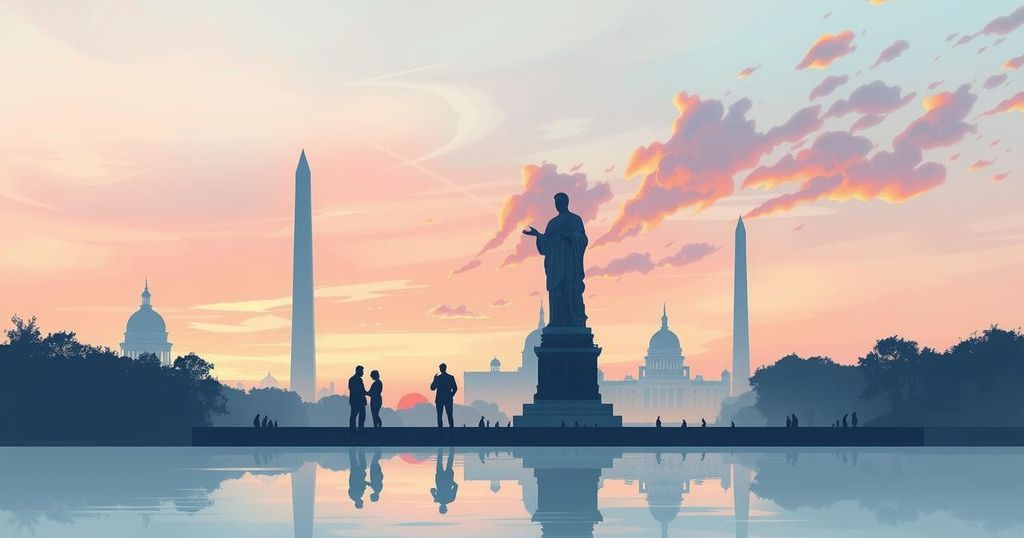Middle Eastern Leaders Discuss Gaza Crisis with Trump During Macron’s Visit
Recent discussions among leaders from Egypt, France, Jordan, and the U.S. focused on the Gaza crisis, calling for a ceasefire and humanitarian aid. A strategic partnership between Egypt and France was established, encompassing economic cooperation and educational initiatives. Additionally, the signs of support for Lebanon’s governance underline a collective regional effort to address current challenges.
On Monday, a significant phone call took place between French President Emmanuel Macron, U.S. President Donald Trump, Egyptian President Abdel Fattah El Sisi, and Jordan’s King Abdullah II, discussing the ongoing situation in Gaza. The call coincided with President Macron’s visit to Cairo for a summit aimed at addressing the conflict in Gaza and consolidating France-Egypt relations into a strategic partnership. The discussions emphasized the increasing international concern regarding the escalating violence and the dire humanitarian situation in Gaza.
During a joint press conference, both President Macron and President El Sisi called for an immediate ceasefire, the urgent release of Israeli hostages, and the provision of humanitarian aid to Gaza. President El Sisi stated, “We reject any calls for the displacement of Palestinians from their land,” and reaffirmed Egypt’s commitment to the reconstruction of Gaza post-conflict. Macron condemned the violence and stressed that Hamas should not govern Gaza moving forward.
Following their discussion, President Macron and President El Sisi continued talks with King Abdullah II, who supported calls for ceasefire and humanitarian assistance. Macron is scheduled to visit Al Arish in North Sinai to further discuss aid relief efforts with local officials. Both leaders expressed their backing for Lebanon’s new government, emphasizing inclusive representation for various religious minorities.
The strategic partnership agreement between Egypt and France encompasses numerous areas of cooperation, including economic collaboration, railway manufacturing, and advancements in technology sectors such as artificial intelligence and cybersecurity. Macron articulated France’s commitment to Egypt’s 2030 development plan, backed by considerable financial aid from the French Development Agency.
Additionally, the partnership aims to enhance educational ties by expanding francophone education in Egypt and supporting cultural exchanges and archaeological projects. President El Sisi highlighted Egypt’s crucial role in managing refugee inflows and requested enhanced support from the European Union, citing the country’s hosting of over nine million refugees.
The two leaders also partook in addressing bilateral business relations, culminating in the Egyptian-French Business Forum to facilitate investment discussions. Macron, accompanied by a delegation of French business representatives, expressed hopes to increase the fluency of Egyptians in French to boost employability in international businesses.
Subsequently, Macron visited the Adly Mansour transit station, a symbol of France’s involvement in Egypt’s public transportation infrastructure. Upon his arrival in Egypt, President Macron was hosted by President El Sisi, engaging in cultural activities including visits to the Grand Egyptian Museum and the Khan El Khalili bazaar. Notably, he arrived in Egypt with a fleet of Rafale fighter jets, reaffirming the strategic cooperation between the two nations.
In summary, the recent discussions among Egyptian, French, Jordanian, and U.S. leaders reflect a concerted effort to address the humanitarian crisis in Gaza, emphasizing an immediate ceasefire and reconstruction plans. The strategic partnership between Egypt and France holds promise for enhanced economic and educational cooperation. The commitment to assist in refugee management further demonstrates the complexities of regional dynamics and the need for international support.
Original Source: www.thenationalnews.com




Post Comment